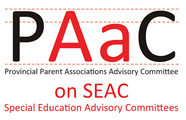A local association member is nominated to SEAC as a representative for a particular association, which may represent families of children with one or more specific exceptionalities. However, a member of SEAC is expected to consider special education programs and services and make recommendations that are in the best interests of all students with special education needs. This requires the members to both understand the unique needs of a specific group of children and be able to consider and make recommendations in the interests of all students with special education needs.
Effective Practices for the local association to provide support to SEAC members include:
- Identifying a contact within the local association that will be a liaison for the SEAC member.
- Designating a staff or volunteer, within the local association, to communicate with SEAC reps, and provide administrative support for nomination process, orientation and training.
- Providing the SEAC member with an outline of their responsibilities to the local association and/or to the provincial association.
- Providing the SEAC members with a forum to share information with local association members and families.
- Sharing a report from the SEAC member in a section of the local association newsletter or bulletin.
- Providing the SEAC member with the opportunity to provide a report at local association meetings.
- Holding a regular or annual meeting of members focused on special education and SEAC.
- Providing SEAC members with an opportunity to gather input from local association members, when necessary, through a survey or meeting of members.
PAAC on SEAC recommends that the SEAC member, representing a parent association, should be provided with training and orientation by the local association and/or the provincial parent association. The training and resources should include copies of all of the relevant association special education policies and position statements of the parent association.
Effective Practices for provincial associations to provide support to SEAC members include:
- Developing a screening process to determine the eligibility of volunteers to be SEAC representatives and assess the volunteer’s skills and knowledge related to special education and working on a committee.
- Describing the expectations for SEAC members, and the consequences for failure to meet expectations, in the SEAC member recruitment documents and process.
- Providing an orientation manual or program to help the volunteer understand the role of SEAC and the parent association.
- Providing a training program or resources to help the SEAC member be informed about special education, the exceptionality or group of exceptionalities they represent, and their roles and responsibilities as a SEAC representative.
- Providing a dedicated section of the parent association website for information on special education. Considering a password protected site for SEAC members to exchange information and network.
Each provincial parent association that is eligible to nominate SEAC members, has a responsibility to develop the capacity to support local associations and their SEAC members. PAAC on SEAC recommends that each provincial parent association develop mechanisms to provide information and training to the SEAC members who represent them. The structure and organization of the provincial parent association may vary, but each provincial parent association needs the capacity to provide SEAC members with up to date information about the students they represent; the latest changes in special education at the provincial level; and be able to collect and use the information from SEAC members.
Effective Practices for the provincial parent associations to obtain up to date information relevant to SEAC members include:
- Establishing a SEAC or education advisory committee, within the parent association, to support SEAC members, develop position papers and provide input on education consultations.
- Providing parent association contact information to the Minister’s Advisory Council on Special Education (MACSE) to be included as a recognized stakeholder for students with special education needs.
- Applying for membership on PAAC on SEAC to obtain updates and network about common issues and concerns.
- Providing SEAC members with regular updates on new initiatives and resources at the Ministry of Education and within the provincial parent association.
- Providing SEAC members with information about on-line resources including:
- Ministry of Education Website section on Special Education
- Ministry of Education Memo Website
- Minister’s Advisory Council on Special Education Repository with Ministry of Education Special Education Updates, MACSE Meeting Minutes and Annual Report
- PAAC on SEAC resources, such as this handbook
(See the References section for websites and additional resources)
